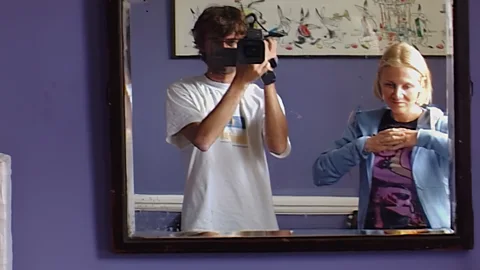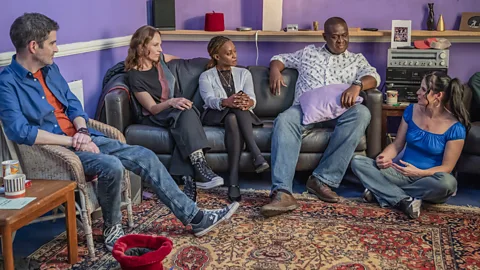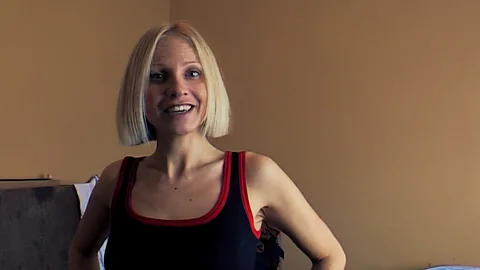The greatest reality TV show never made
 The Greatest Show Never Made, Prime Video
The Greatest Show Never Made, Prime VideoTwo decades after a British reality TV show was exposed as a sham, a new three-part docu-series explores how the contestants have coped since – and what drew them in the first place, writes Louis Staples.
It started with an advert. In 2002, a new British reality TV show was about to be launched. The prize? £100,000. The concept? Unclear. The wannabe contestants? People who thought of themselves as "characterful, resourceful and energetic". All they knew was that they would have to give up their lives for a whole year. They didn't even know what channel the secret show was going to be on, but that didn't matter. Hundreds applied.
Jane Marshall was one of them. She was 21, and living with her parents in Manchester at the time. The show seemed like an exciting way to escape her life, where she was doing ordinary things like working a nine-to-five job and spending her weekends clubbing with friends. There must be a bigger and better reality out there for her. Maybe this was it? "I just knew it was going to be so exciting and challenging," she tells BBC Culture.
Some auditionees were attracted by the money. Others, like Jane, were drawn to the flame of reality TV fame. The intense audition process was conducted by Nikita "Nik" Russian – a young and handsome TV guru whose production company was making the show. Thirty were chosen, including a presenter and camera person who would be part of the contest, while also filming and narrating the action. It promised to be like nothing we had seen before. The next big thing. "I thought we'd be given these amazing tasks," Jane re. "That we'd have to think on our feet and work together to win challenges and points."
 The Greatest Show Never Made, Prime Video
The Greatest Show Never Made, Prime VideoThe only problem? The show didn't actually exist. "Nik" wasn't a hot-shot TV boss. He was a man named Keith from Surrey, who had dropped out of university and now worked part-time in a bookshop. No TV channel had commissioned the show. The eponymous company, Nikita Russian Productions, didn't actually exist either.
After gathering in central London and being told their mission – to work together to collectively earn £1m in a year and "beat money at its own game" – things quickly started to unravel. When the contestants realised they had nowhere to live, no jobs and no money, two of the three teams immediately bailed. The remaining team soon found themselves marooned in east London, crammed into a small flat and sleeping on the floor in sleeping bags. It was a far cry from the glamorous world of TV they thought was awaiting them. The audition process had seemed so slick and professional, but suddenly everything had fallen apart. They were devastated.
When the media caught wind of this story, the contestants were presented as "wannabes" on the news. The British comedian Harry Hill mocked them on his show, TV Burp. Why would anyone give up their life for a year to go on a show that didn't exist? But there is more to this story.
Two decades on, The Greatest Show Never Made – a new three-part docu-series that launches on Prime Video today – re-tells the story of the one team of contestants who stayed in the game and the show's mysterious creator. Through a mixture of archival self-filmed footage, interviews and colourful re-enacted scenes, we learn about how they were each using the show to chase their dreams.
 The Greatest Show Never Made, Prime Video
The Greatest Show Never Made, Prime VideoThis bizarre story didn't actually start with a misleading (to put it lightly) advert in the paper. It began several years earlier, when reality TV first became a cultural phenomenon. In the US, MTV's The Real World – a show that filmed a group of young people living together in a loft – and survival competition show Survivor were drawing tens of millions of viewers at the turn of the millennium.
In the UK, the same shift was happening, albeit with different shows. ITV's singing show Pop Idol was turning ordinary people into pop stars overnight. The first two series of Big Brother had driven the news agenda and become must-watch appointment TV. Big Brother started out as a social experiment, but beyond the walls of the house its impact was much greater.
Suddenly, regular people could be famous for being themselves. A traditional talent – singing, acting, athleticism – was no longer a prerequisite for fame. Our notion of celebrity was forever changed, setting the wheels in motion for the norms of today, where Kim Kardashian is one of the world's most famous people, and where more young people want to be an influencer or a YouTube star than a doctor.
Reality TV fame is now so normalised in our culture that we barely hear the phrase "famous for being famous" anymore. But in 2002, there was no blueprint of reality TV stardom. It was all brand new. "We had to explain that to the audience so that they didn't think the contestants were stupid," director Ashley Francis-Roy tells BBC Culture. "Of course, if you got offered this exciting opportunity you would go for it, wouldn't you">window._taboola = window._taboola || []; _taboola.push({ mode: 'alternating-thumbnails-a', container: 'taboola-below-article', placement: 'Below Article', target_type: 'mix' });
